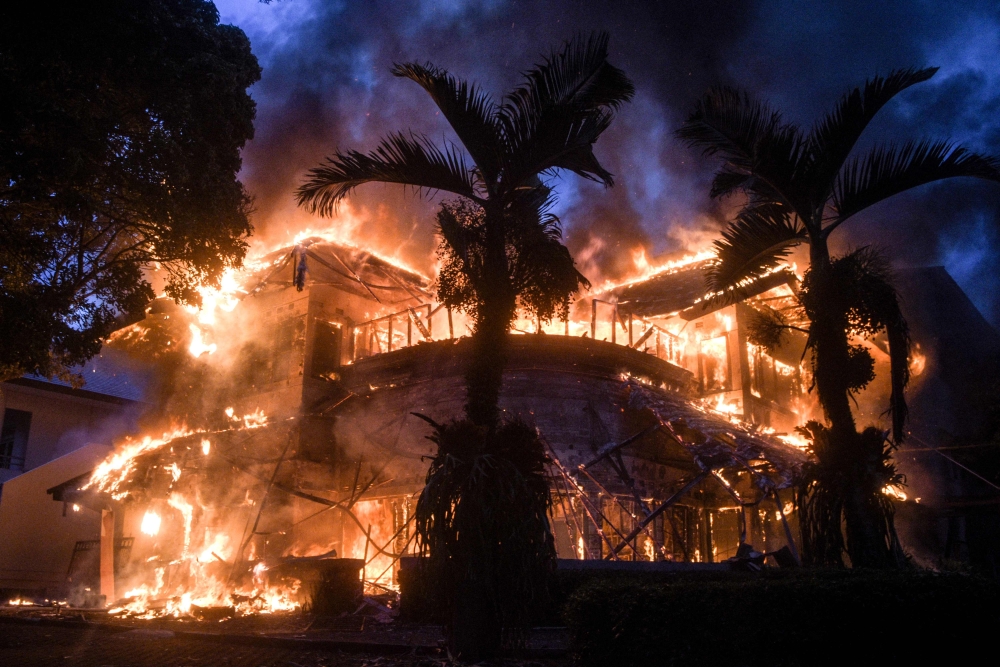
When the house burns: Lessons from Indonesia’s unrest — Shahridan Faiez
Monday, 01 Sep 2025 2:51 PM MYT
SEPTEMBER 1 — Over the Merdeka weekend, as Malaysians celebrated the 68th anniversary of independence with parades and fireworks, a disturbing scene was unfolding in neighbouring Indonesia. Streets in Jakarta and other major cities were filled with angry demonstrators. What began as public protests against the rising cost of living and unemployment soon spiralled into nationwide unrest.
The Indonesian situation
The spark came when news broke that parliament had approved a massive housing allowance for its members – ten times the minimum wage – at a time when ordinary Indonesians were struggling to make ends meet. The outrage intensified after a parliamentarian mocked the protesters as “fools”. When a food delivery rider was tragically killed by a police vehicle in Jakarta, the country’s simmering anger ignited into fury.
Of all the grievances, housing became the symbolic centre of protest. Crowds began targeting lawmakers’ homes, ransacking them and setting them on fire. So far, four parliamentarians have become victims of mob attacks – including the highly respected Minister of Finance. Why housing? Because it represents security, dignity, and stability. In a time of precarious living – low wages, rising unemployment, and soaring prices – having a roof over one’s head is the last bastion of resilience for ordinary people.
Adding fuel to the fire were viral social media videos exposing the opulent lifestyles of politicians. One particularly shocking YouTube clip showed the lavish home of Ahmad Sahroni, the first lawmaker to be targeted: a fleet of luxury cars, an indoor pool, life-sized Marvel figures – symbols of a ruling elite grossly out of touch with public suffering.
Should Malaysia be worried?
As Malaysians watch these dramatic scenes with a sense of disbelief, it is worth pausing to reflect on our own vulnerabilities. Like Indonesia, we face a stubborn problem of economic disparity. In fact, our Gini coefficient – a measure of income inequality – is higher than Indonesia’s. That means the gap between rich and poor is wider here.
The disparities between regions are also stark. GDP per capita in Kuala Lumpur is more than four times higher than in Sabah, five times higher than in Kedah, and six times higher than in Kelantan. This imbalance is compounded by an escalating cost of living that has not eased despite the creation of a dedicated ministry. Malaysians feel the pinch daily – from the price of a simple teh tarik to the cost of a family meal.

In a time of precarious living – low wages, rising unemployment, and soaring prices – having a roof over one’s head is the last bastion of resilience for ordinary people. — AFP pic
For many households in the city, life is precarious. Some take on multiple jobs, skip meals, cut household expenses, and depend on easy credit just to survive. Perhaps the most telling sign of desperation is that people can now buy KFC fried chicken through a buy-now-pay-later scheme. When basic food becomes a debt-financed purchase, something is seriously wrong.
Public discontent is already simmering. Over the past year, students, lawyers, and civil society groups have staged protests over various issues. The recent draft Urban Renewal Act has become another flashpoint. Critics say the bill, instead of prioritising urban renewal, empowers developers to override local communities. The fear that one’s home – one’s sanctuary – could be threatened by policy decisions has struck a deep nerve, mirroring the housing symbolism now fuelling unrest in Indonesia.
Lessons for Malaysian policymakers
It is true that Malaysia does not share Indonesia’s strong culture of street protests. Our economy is also more resilient, and our administrative machinery is more capable of delivering aid and stabilising the system. Yet history teaches us that even seemingly stable systems can unravel quickly.
Indonesia’s own experience in 1998 offers a cautionary tale. A rumour about rice shortages and the killing of student protesters at Universitas Trisakti triggered a chain reaction that toppled Suharto’s 32-year rule. Today, the pattern is eerily familiar: economic stress, anger at privilege, and a spark that ignites a firestorm.
We pray that Indonesia weathers this storm and that the crisis becomes an opportunity for strong meaningful reforms. But we must also take heed. Malaysia needs bold measures to reduce inequality, address the cost of living, and ensure housing security. This means revisiting policies that disproportionately favour the elite, rethinking regional development strategies, and strengthening social safety nets.
Economic disparity is not just an economic issue – it is a political time bomb. If left unchecked, it can ignite unrest in even the most orderly societies. For Malaysia, the lesson is clear: listen, learn and act. May Indonesia’s turmoil serves not as a spectacle for us to watch, but as a mirror for us to learn from.
* Dr Shahridan Faiez is a trustee of Citizens International (www.citizens-international.org), an action-based human rights non-governmental organisation based in George Town, Penang.
No comments:
Post a Comment